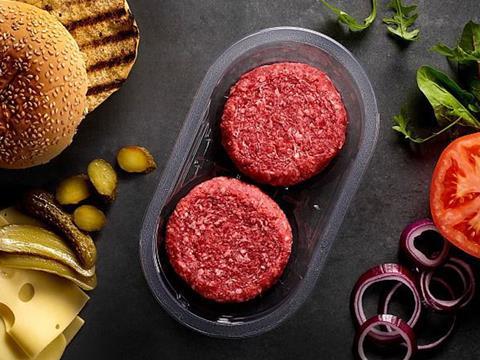
Klöckner Pentaplast (kp), a plastics manufacturer of food packaging for fresh food, recently ran a successful pilot as part of a Working Group with Petcore Europe to demonstrate that recycling post-consumer pots, tubs and trays made from Polyethylene Terephthalate (PET) from the domestic recycling stream can be used to manufacture more protective food packaging, creating a closed loop process for tray to tray recycling.
The project started to show clear evidence that post-consumer PET packaging can be recycled back into more food packaging without the addition of clear PET bottle flakes. This is a pivotal study to encourage recycling of PET food packaging and not just drinks bottles at the domestic recycling collection point.
With thanks to successful sorting at Valorplast, a recycler of PET flake and washing trials at Wellmann International, a plastics processor, whom are both based in France, this working group with Petcore Europe has generated a case study in a European country that rPET flake from food trays can be extruded into new PET rigid film, which can then be thermoformed back into pots, tubs or trays. This adopts the ‘Activate’ pillar of kp’s Positive Plastics Pledge, which is committed to driving change at scale through demonstrating the recyclability of the PET trays which will encourage better recycling infrastructure globally, achieving a circular economy. During the pilot, 20 tonnes of post-consumer recycled PET flake has been recycled back into food trays manufactured by kp in Spain.
In the past, when using post-consumer recycled PET, the pots, tubs and trays would often need to have a virgin layer of PET on the food contact side of the packaging to comply with food safety regulations. However, using special supercleaning technology allows kp to use the recycled PET flakes without the need of a virgin layer. The evidence from this case study led by kp has created a new stream of valuable recycled material into the food packaging industry. Learnings from the pilot are also providing evidence on how to improve flake quality, reduce the presence of multi-layers, and assure food safety.
Tray to tray recycling is not new to kp, in the UK, food trays have been manufactured from 100% post-consumer rPET, using a mix of recycled PET bottle flake and more recently a small amount of post-consumer trays. In parallel kp joined the Petcore PET Thermoforms Working Group to create an industry-wide proven and monitored track record of 100% PET tray recycling, to encourage local authorities and municipalities, and recyclers to include plastic pots, tubs and trays in their domestic recycling infrastructure.
This fundamental initiative supports kp’s Positive Plastics Pledge which is framed within a four-point plan, outlining kp’s commitment to promote, support and sustain a circular economy for plastic, and to create value from plastic waste. kp’s successful pilot in collaboration with Petcore Europe are examples of the pledge’s ‘Innovate’ and ‘Activate’ pillars in action. Many collaborations and innovations are leading to further success across Europe in an effort to recover plastic waste, which is a valuable raw material rather than dispose of it because of different collection systems and diverse packaging structures.
Petcore Europe PET Thermoforms Working Group was established in June 2015 and comprises of up to 50 companies and organisations including key stakeholders from industry and waste management. Their goals align with kp’s in identifying sustainable and reliable end of life options for PET thermoforms and its effective recycling through collaboration among all parties in the value chain.
















